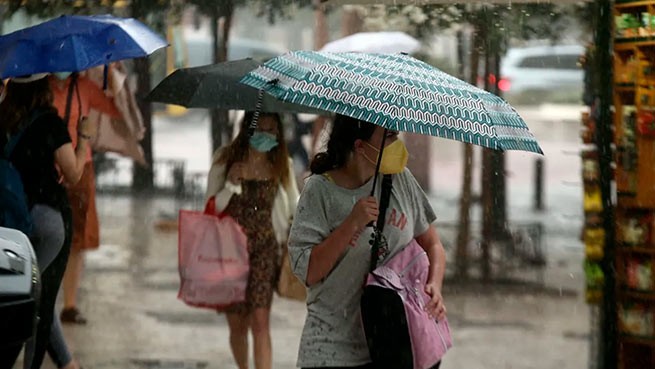With a particular focus on heat-wave conditions in Greece, a study of tourist flow in Europe shows that weather patterns are directing travelers to countries other than the south of Europe.
High summer temperatures in southern Europe, more frequent and longer heat waves could lead to an irreversible change in travel habits, with more travelers choosing cooler destinations. In addition, foreign tourists could choose a different season for their holidays, such as spring or autumn, to avoid extreme heat. At least that’s what tour operators and experts predict.
Data from the European Tourism Commission (ETC) show that the number of people hoping to travel to the Mediterranean region between June and November has already fallen by 10% from last year as hot weather led to drought and fires. And vice versa, increased interest in destinations such as the Czech Republic, Denmark, Ireland and Bulgaria. “We expect unpredictable weather conditions in the future to have a greater impact on traveler choices in Europe,” said Miguel Sanz, head of ETC.
The organization’s report also shows that 7.6% of travelers are currently considering extreme weather as a major travel challenge during the period from June to November. It provides specific examples of travelers who canceled or shortened their vacation due to the heat in southern European countries.
Nevertheless travel companies say the heat wave has yet to cause many cancellations. “The British, in particular, are keen on the Mediterranean and often book accommodation months in advance as they still want to escape to the beach after years of ‘lockdown’ due to the COVID-19 pandemic,” says Sean Tipton, spokesman for British travel agencies. ABTA. But that balance could change as the heatwaves become more debilitating. Scientists have long warned that climate change will make these weather events more frequent, more severe, and more deadly.
Forecasters predict next week’s temperature could surpass the current European record of +48.8°C set in Sicily in August 2021, which raises fears of a repeat of last year’s heatwave deaths.
In recent weeks, the European media has been flooded with stories of tourists evacuated from Italian beaches by air or taken by ambulance from the Acropolis to the Athens hospital. “Our recent survey shows decrease in the number of people interested in traveling during the peak month of Augustwhile more Europeans are considering traveling in the fall,” said Mr Tipton.
?Αστυνομικοί της Ομάδας ΔΙ.ΑΣ. και διασώστες του ΕΚΑΒ παρείχαν βοήθεια σε τουρίστρια, λόγω καύσωνα, στην Ακρόπολη. pic.twitter.com/2MdKaJu96Q
— Ελληνική Αστυνομία (@hellenicpolice) July 14, 2023
Tourists in Rome told Reuters they would think twice before booking a trip there again in July as they battled the heat by drinking plenty of water, trying to stay cool and finding air-conditioned places to stay.
.
This is bad news for Italy’s economy, which thrives on tourism. The Italian Ministry of the Environment warned in a report this year that foreign tourists will travel more in spring and autumn in the future, and choose cooler destinations. “The balance will be negative, among other things, because part of the Italian tourists will contribute to the flow of international tourism to less warm countries,” the report says. Some hope this change will just be a traffic change and not a reduction.
In Greece international flights grew by 87.5% year on year between January and March. The real pandemonium is recorded on the islands. According to the Greek Ministry of the Environment, an increase in travel during the winter, spring and autumn months could mitigate this problem and offset the potential decline in demand for summer vacations.
Greek authorities closed the Acropolis on Friday at the hottest time of the day to protect tourists. In Spain, demand is expected to be high for coastal areas in the north of the country and on the Spanish tourist islands, where temperatures tend to be cooler in summer, according to a report from the national tourism association Exceltur.







More Stories
The cheapest organized beaches of Attica, marked with the Blue Flag
A village considered the most picturesque in Greece
"Leaning Tower of Pisa" in Greece: the Roboto paradox